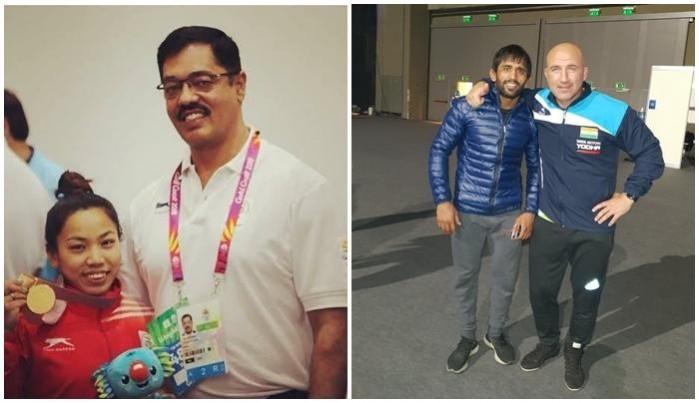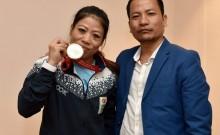India ended the Olympic Games in Tokyo with its best medal haul ever, a total of seven -- one gold, two silver, and four bronze.
The credit for this historic tally and the overnight fame have gone deservedly to Neeraj Chopra, Saikhom Mirabai Chanu, Ravi Kumar Dahiya, P.V. Sindhu, Lovlina Borgohain, Bajrang Punia and the men's hockey team, but we must pause to note the unseen hand of the coaches -- seven foreign and one Indian -- who played key roles in fashioning this moment of victory. Here's a look at who they are:
Uwe Hohn (coach) and Dr Klaus Bartonietz (bio-mechanical expert):

Moulded Neeraj Chopra into champion thrower
Uwe Hohn took over as Neeraj Chopra's coach a few years ago and played a big part in moulding the young Indian into a world-beater. A pioneer in javelin throw from Germany, Hohn worked on perfecting Chopra's technique and in 2019 handed him over to his compatriot Bartonietz, who added muscle to the athlete's frame.
Though Hohn had differences with Chopra's medical team over the 23-year-old's surgery following an elbow injury in 2019, Bartonietz continued with him during his rehab and recent training and competition camp in Europe before the Olympics. The result was the confident manner in which Chopra decimated all opposition with a huge throw in his first attempt in the final.

Park Tae-Sang (South Korea)
Turned Sindhu into an all-round player. Park became P.V. Sindhu's coach a couple of years ago and has played a crucial role in her development into an all-round player. A gold medalist in the men's team event at the 2002 Asian Games in Busan, South Korea, Park helped Sindhu improve her defence and netplay.
This enabled the 26-year-old shuttler from Hyderabad to overcome top players such as Akane Yamaguchi (Japan), He Bingjiao (China) and Mia Blichfeldt (Denmark) with her deceptive net dribbles. Park was brought by chief coach P. Gopichand in 2019 to train the men's team, but he soon became a part of Sindhu's coaching staff.
Graham Reid (Australia) - Transformed the men's hockey team
Reid, who won a silver medal playing for Australia in the 1992 Barcelona Olympics, helped the Indian team transform from a quarterfinalist to a bronze medal-winning team. Both Reid and the Indian team had ended Rio Olympics in 2016 on a disappointing note, the Indians crashing out of Belgium in the quarterfinals, even as Reid's Australia went down 4-0 to the Netherlands. The Australian, hired in 2019, picked a team comprising players who could play multiple roles and showed resilience to come back from the disastrous 1-7 defeat suffered at the hands of Australia.
Raffaele Bergamasco (Italy) - Gave Lovlina the confidence to excel
The chief coach of the women's boxing team working under high-performance director Santiago Nieva has played a big role in Lovlina Borgohain's bronze win in women's welterweight boxing. Though Bergamasco has been with various Indian teams since 2001, his contract was not renewed after the 2016 Olympics. He was back in favour in 2019 and has since helped the women's team excel. He is the man behind how Lovlina started aggressively and played with a free mind in Tokyo.
Shako Bentinidis (Georgia) - Pumped aggression into Bajrang Punia
Bajrang Punia's coach helped him transform into an aggressive wrestler who is never shy of attacking his opponent. Bentinidis has helped arrange sparring partners for Bajrang from Russia and his native Georgia. He is the reason behind Punia becoming a top contender in 65kg. The Olympic debutant could have done better in Tokyo but for the knee injury that hampered his movement.
Kamal Malikov (Russia) - Worked on Ravi Dahiya's counter-attack
He took over as Ravi Kumar Dahiya's coach as recently as April 2021, after it became clear that two-time Olympic medallist Sushil Kumar was unlikely to make it to Tokyo. He was initially brought in to be the sparring partner and fitness trainer for Sushil, but later took charge of Dahiya, arranging quality sparring partners for the 23-year-old. Malikov worked on the reaction speed and counter-attack of Dahiya that helped him reach the final in Tokyo.
Vijay Sharma (India) - Stood by Mirabai through her highs and lows
Vijay Sharma has been the chief national coach for the last many years and took charge of Mirabai when she became a national champion in 2014, just before the Commonwealth Games. He has coached her since, through her highs and lows, helping her win medals at the Commonwealth Games, World Championships and Asian Games. A lifter whose career was cut short by a wrist injury, Sharma played a big role in getting Mirabai back on track after she fouled out her three attempts in Rio de Janeiro.

















